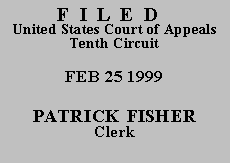

| MARK SWANGER, |
|
We review a Rule 8(a) dismissal for an abuse of discretion, ordinarily after time is given to amend a complaint pursuant to Fed. R. Civ. P. 15(a). See Mangan v. Weinberger, 848 F.2d 909, 911 (8th Cir. 1988). With his notice of appeal, Mr. Swanger apparently attempted to amend the complaint. See R. doc. 49. We have reviewed the district court pleadings as well as Mr. Swanger's submissions on appeal and conclude that the district court did not abuse its discretion. See Carpenter v. Williams, 86 F.3d 1015, 1016 (10th Cir. 1996). Fed. R. Civ. P. 8(a)(2) requires short and plain statements of claims showing that a plaintiff is entitled to relief. The complaint (and attempted amendment) consists of recounting numerous incidents without sufficient identification of actors and applicable legal theories. See Monument Builders of Greater Kansas City, Inc. v. American Cemetery Ass'n of Kansas, 891 F.2d 1473, 1480 (10th Cir. 1989) (discussing purpose of complaint).
The motion to proceed on appeal in forma pauperis is DENIED pursuant to 28 U.S.C. § 1915(e)(2)(B)(ii), and the appeal is DISMISSED.
Entered for the Court
Paul J. Kelly, Jr.
Circuit Judge
*. This order and judgment is not binding precedent, except under the doctrines of law of the case, res judicata, and collateral estoppel. This court generally disfavors the citation of orders and judgments; nevertheless, an order and judgment may be cited under the terms and conditions of 10th Cir. R. 36.3.
**. After examining the briefs and the appellate record, this three-judge panel has determined unanimously that oral argument would not be of material assistance in the determination of this appeal. See Fed. R. App. P. 34(a); 10th Cir. R. 34.1(G). The cause is therefore ordered submitted without oral argument.